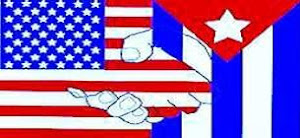1) U.S. Cuba Diplomatic Discussions of January 2015
Key Takeaways:
Making it all about Human rights.
A. Main stumbling block is what will be the official posture of U.S. diplomats in Havana with respect to opposition figures? Cuba's dissident movement is financed in part by the U.S. taxpayer. As we have stated on the blog in prior postings, there are two dissident movements in Cuba. One is genuine and the other is orchestrated and propped by us.
B. Challenges for both sides on Human Rights. How does the United States promote those human rights ideals without the Cubans being mistrustful? How can Cuba see ideals like free press, pluralism, allowing an opposition to exist without interpreting these as a threat to Cuban sovereignty? One Cuban commented to me, "if there are multiple political parties in Cuba, that means one will be controlled and manipulated by Cubans in Miami. That is not acceptable." Where is my copy of the Federalist Papers in Spanish edition?
C. What are the limits on Human Rights in diplomatic negotiations? The United States does not apply the same conditions on China, Saudi Arabia, Vietnam, or other authoritarian nations. Why is this standard being applied to Cuba?
What is Negotiable. What is Not.
D. Cuban President Raul Castro used a negotiating tactic to drive a point home of what is and what is not negotiable. He stated that a Cuban demand for normalization is the return of Guantanamo Bay. The United States responded in kind, stating that the topic is not on the bargaining table now. Similarly, Cuba explains, its political system is not on the bargaining table either.
http://www.usnews.com/news/politics/articles/2015/01/23/at-odds-on-human-rights-us-and-cuba-move-toward-embassies
http://www.reuters.com/article/2015/01/22/us-cuba-usa-idUSKBN0KV0E720150122
2) U.S. Congressional Hearings
Three Congressional hearings were held, one in the U.S. Senate, and two in the House. Testimony was mostly heard from Cuban dissident figures. The opposition's main argument is that Cuban dissidents do not support the U.S. opening with Cuba and the U.S. did not get anything in return for the opening. Testimony at the hearing revealed the contrary, while there are some dissidents who do not support U.S. engagement, many do support the opening. In fact, one dissident admonished the United States not to get involved with Cuban internal politics, that this is a matter for Cubans only.
In another example of the dark influence of money in politics, most Members of Congress who were critical of the Administration's opening had two things in common; except for the Cuban American hardliners, they had never visited Cuba and many had received major contributions from the pro-sanctions U.S. Cuba Democracy PAC. Where they fell short in their presentations was the fact that their questioning and posturing was rehearsed and staged for the most part. You can tell when a Member of Congress is authentically taking a position and when one is not. Kudos to the U.S. State Department team that kept their cool and focus while being bullied by certain members of the committees during the hearings.
One subsequent fallout from the hearings for the dissidents was the repudiation and demand by members of the Ladies in White in Havana for the resignation of its leader, Ms. Berta Soler. Mrs. Soler, who testified before Congress, is a Cuban dissident who supports keeping the U.S. embargo and sanctions policy in place and receives funding from foreign sources.
http://www.foreign.senate.gov/hearings/understanding-the-impact-of-us-policy-changes-on-human-rights-and-democracy-in-cuba
http://foreignaffairs.house.gov/hearing/hearing-cuba-assessing-administration-s-sudden-shift
http://foreignaffairs.house.gov/hearing/subcommittee-hearing-human-rights-cuba-squandered-opportunity
https://www.opensecrets.org/pacs/pacgot.php?cycle=2014&cmte=C00387720
3) U.S. Congress Introduce Bipartisan Bills to end Embargo and lift Travel Restrictions
S. 299 - Freedom to travel to Cuba Act of 2015 - Senator Jeff Flake (R-Az)
H.R. 664 - Companion Bill - Rep. Mark Sanford (R-SC)
S.491 - A bill to lift the trade embargo on Cuba - Senator Amy Klobuchar (D-Mn)
H.R. 634 & H,R. 635 - Export Enhancements Acts to Cuba - Rep. Charles Rangel (D-NY)
H.R. 403 - Free Trade with Cuba Act -Rep. Charles Rangel
H.R. 735 - Lift Trade Embargo -Rep. Jose Serrano (D-NY)
H.R. 570 - Stop Wasting Taxpayer Money on Cuba Broadcasting Act
It is going to take serious and committed grassroots and interests lobbying to get these bills passed.
The triangle of moderate Cuban Americans flanked by business interests on one side and non governmental organizations and think tanks on the other side must be unified and engaged if they are going to overcome the money and influence of the smaller but still powerful pro-embargo side in Congress.
4) U.S. Amends Cuban Assets Control Regulations to Permit Importation of Certain Goods and Services from Cuba Provided They are Provided and or Created by Private Enterprise Sources.
http://www.state.gov/e/eb/tfs/spi/cuba/515582/index.htm
Consistent with the January OFAC Regulations expanding travel to Cuba, more guidance is offered on what "Support for the Cuban People" means. See 31 CFR 515 sections 515.560 (a)(8) and 31 CFR 515.574. http://www.ecfr.gov/cgi-bin/text-idx?SID=0feb595cb5a5992928afeb85c62b98c6&node=pt31.3.515&rgn=div5
With certain product exceptions, many goods and services created and provided by Cubans engaged in self employment and private enterprise may sell and export them to the United States.
Americans can travel to Cuba to support and engage these private Cuban entities. Clearly from the regulations, they are being empowered to do so now.
5) Congressional Delegations Visit Cuba
Since the announcement of December 17th, three Congressional delegations, two Senate, one House have visited Cuba. We believe the more Members of Congress that visit Cuba, the better. One thing that virtually all conclude from visiting the island, our sanctions policies of embargo, travel restrictions, and hostility have done nothing to change Cuba or improve the lives of the Cuban people.
http://www.cnn.com/2015/01/16/politics/congressional-delegation-travels-to-cuba/
http://miamiherald.typepad.com/nakedpolitics/2015/02/nancy-pelosi-leads-congressional-delegation-to-cuba.html
http://www.reuters.com/article/2015/02/17/us-cuba-usa-idUSKBN0LL1K120150217










0 Comments:
Post a Comment